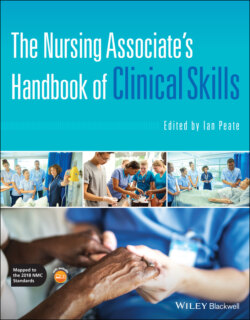Читать книгу The Nursing Associate's Handbook of Clinical Skills - Группа авторов - Страница 41
Barriers to Effective Communication
ОглавлениеNursing associates who are aware of the common barriers to effective communication will be able to anticipate and react to ensure optimal communication and patient care. There are many factors that can create communication barriers, and some of the common ones are listed here:
Environmental barriers can arise due to issues with the setting in which care is provided, be it at home, close to home or in hospital; all can impact communication due to factors such as noise, lack of privacy and lack of control over who is present.
Personal barriers can be created by healthcare professionals, including nursing associates, working in areas where staff conflict and workloads are high, resulting in lack of time or support for patients. Communication can also be impacted when the nursing associate lacks skills or strategies for coping with difficult emotions, reactions or questions.
Physiological barriers: People can experience difficulty in hearing or speech following conditions such as stroke or brain injury. Hearing and eyesight problems become more common as we age, and as the population is living longer, these issues may become more prevalent in years to come. The nursing associate needs to develop an awareness of the challenges these barriers create for effective communication and work collaboratively with the patient, their family/carers and other healthcare providers such as speech and language therapists.
Psychological barriers such as fear and anxiety can impact a person’s ability to listen to what the nursing associate is saying. Patients may worry about being judged or becoming emotional. The patient may struggle to explain their feelings and attempt to appear strong for someone else’s benefit.
Cultural barriers can impede communication especially when the nursing associate is unable to demonstrate cultural competence. Lack of understanding, or lack of curiosity, about different cultures can result in negative patient experiences. Different cultures have different beliefs about personal space, understanding of illness and acceptable treatment options. It is important for nursing associates to think about their own experiences when considering cultural differences in communication and how these can challenge patients and healthcare professionals. It is important for the nursing associates to demonstrate cultural awareness when caring for people and to ensure that their needs, priorities, expertise and preferences are always valued and taken into account (Nursing and Midwifery Council 2018b).
